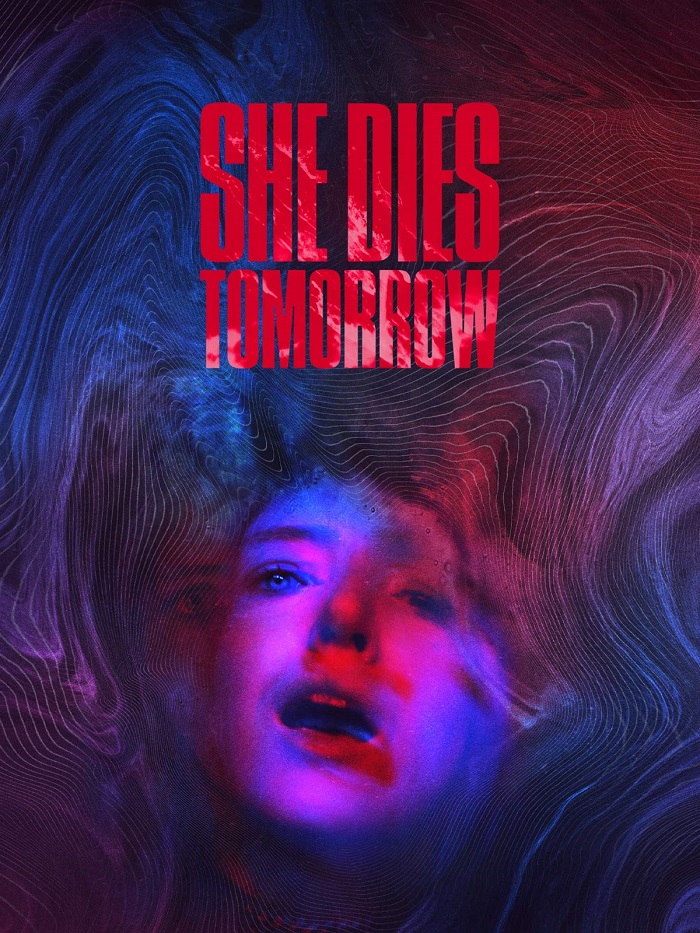
The premise is in the title: She Dies Tomorrow. She knows she’s going to. She’s certain of it. So certain that she, a recovering alcoholic, takes a drink for the first time in a while: what does it matter? She dies tomorrow. She’s Amy (Kate Lyn Sheil) and she calls her friend Jane to come over. Jane (Jane Adams) sees Amy’s drunk, and listens to her babble about how she’s going to die for as long as she can take, then leaves.
Then, after a short amount of time at home, alone, Jane becomes convinced. It’s going to happen to her, too. She is going to die tomorrow. Jane goes to her brother’s house to the birthday party for her sister-in-law she’d skipped, and lets them know: she’s going to die. Tomorrow. The idea spreads, like a mind virus, and eventually, long after Jane leaves and the party is over, they all realize the same thing.
She Dies Tomorrow was written and directed by Amy Seimetz. Though she’s acted in some large budget studio pictures (Alien: Covenant and Pet Semetary) and made a television show for Starz, Seimetz is most closely associated with the American independent film scene. This is her second feature, and it certainly demonstrates independence. The premise could service a horror film, a thriller, some kind of mind-warping science fiction story.
Instead, She Dies Tomorrow focuses on the simple human question: what happens when you know you will die tomorrow? What do you do, see, feel? Amy flashes on memories of a recent lover. Jane goes to see a doctor. Susan and Jason, Judy’s sister-in-law and brother, hug their child… and then begin to blame Judy for bringing this revelation to their doorstep.
There’s no explanations, no investigations, no reasons and no bargaining. Just a realization that whatever they do, are, and care about ends. That’s a grim discovery, and some of the film is grim… but the She Dies Tomorrow doesn’t settle down on one tone from beginning to end. Amy, who is fixing up a house she just bought, filled with Amazon boxes reused for packing that she will now never unpack, wants to touch things. She listens to Mozart’s Requiem on repeat. She’s listening to it on vinyl, so that repeat is manual. Then she rubs her hands on walls, on the floor, in dirt. It’s odd, and feels very, very indie movie. But the birthday party Judy interrupts when her own realization takes hold is awkwardly amusing. The two other guests look like they would be anywhere but there, and would almost welcome the knowledge of their impending doom if it gave them a reason to leave.
The story isn’t interested in explanations, and the filmmaking style isn’t, either. Seimetz isn’t in a hurry to explain scenes as they unfold, and the narrative is only roughly linear. Some of the images from early on in the film don’t develop into any meaning until connected with others far later in the film. Her compositions tend to contain multiple frames, and blocked off angles obscuring the view. In one striking shot, Amy falls onto her couch, which is completely obscured by boxes, so she’s completely gone from view – like tomorrow came early.
It’s visually compelling, and an intriguing premise. What I primarily wished, watching the film, was that it was happening to different characters. There’s a tradition of understatement and an aversion to broadness in modern American independent cinema that, in my opinion, is often taken too far. We have hints of who these characters are, there’s suggestions of backstory and motivation and even some proper direct out and out conflict. But most of it is indirect and allusive. I was never immersed in the stories of any of the individual characters, except perhaps for the birthday party guest Brian, played by Tumbe Adebimpe. He has, I think, the least dialogue of anyone in the film, but he imbues his brief screentime with a wry sense of humor and sadness that made me want to see more. For the rest of the characters, it was like being told a story about people who neither I nor the storyteller knew very well.
There’s an uncomfortable emptiness to these characters, but that might well be part of the point of the film. Confronted with eternity, their responses are mostly self-centered and mopey, when they’re comprehensible. And that’s another aspect of this style of cinema, that it refuses to lead the audience around by the nose. She Dies Tomorrow is very connected to this 21st century independent tradition – so much so it’s almost shocking that neither of the Duplass brothers appears at any time, though one of their wives shows up for good measure.
She Dies Tomorrow, despite its near sci-fi premise and mysterious goings on, is not a puzzle for the audience to figure out. It’s more of a tone poem, where the scenes are as direct or as abstract as they need to be to convey mood, perhaps more than ideas. Even if that’s not what I necessarily want from a film, She Dies Tomorrow has a captivating style and a shifting tone that keeps interest up. It may have not gone where I wanted, but the film does go places.
She Dies Tomorrow is currently available to rent or buy On Demand.
1 Comments
Leave a Comment
You must be logged in to post a comment.
[…] Jay Keitel, She Dies Tomorrow | Review […]